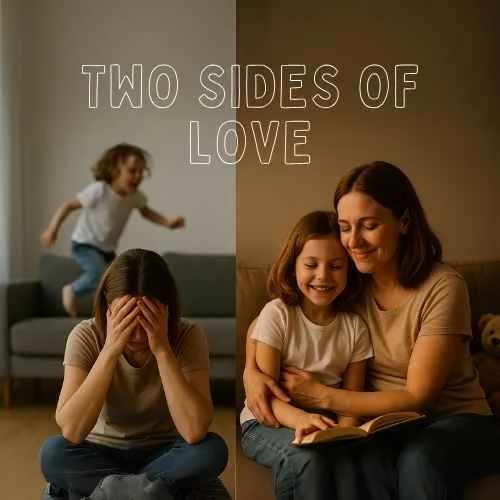I Have No Patience for My ADHD Child - Why That Doesn’t Make You a Bad Parent
I Have No Patience for My ADHD Child
I Have No Patience for My ADHD Child - I’m Yelling Again… I Hate That I’m This Parent
You’re Not Alone in This
If you’ve ever whispered to yourself, "I have no patience for my ADHD child," and then felt a wave of guilt, you’re not a bad parent. You’re a human being. Tired, stretched, and hurting. Parenting a child with ADHD can be joyful and rewarding. But it can also be relentless.
Maybe you’re running on little sleep. Maybe school mornings feel like war zones. Maybe your child’s energy or meltdowns feel too much to handle. This blog is here to help you understand why this happens and how to break free from the guilt and burnout cycle. Keep reading. There is a path forward.
Why Saying “I Have No Patience for My ADHD Child” Is More Common Than You Think
You’re Not Broken. You’re Burned Out
Many parents carry deep shame over losing their cool with their ADHD kids. But ADHD isn’t just hyperactivity. It affects attention, impulse control, emotional regulation, and more. Everyday tasks can turn into exhausting battles when your child’s brain struggles with focus and control. You may feel like your patience is constantly tested. This doesn’t mean you’re weak. ADHD requires a different kind of parenting stamina. Most of us weren’t trained for that.
Traditional parenting advice doesn’t always apply. It’s no wonder you feel stretched thin. You’re not broken as a parent. You’re burned out from the demands of a complex condition.
Understanding ADHD: Why Your Child’s Behavior Feels So Overwhelming
It’s Not Personal. It’s Neurological
When your child talks back, can’t sit still, forgets instructions, or has explosive outbursts, it’s not a sign of disrespect. It’s their ADHD brain struggling with self-regulation.
Here are some behaviors that wear down parental patience:
Constant movement or fidgeting
Difficulty following multi-step instructions
Emotional outbursts over small frustrations
Seeming “not to listen” when spoken to
These behaviors are not about defiance. They are signs of how their brain processes the world.
Knowing it’s brain-based can shift your perspective from frustration to compassion. But that doesn’t make it easy. It just means you can stop taking it personally. And that helps.
The Emotional Toll: What Chronic Frustration Does to Parents
When Guilt and Fatigue Become a Daily Struggle
You may love your child deeply and still feel drained. You might feel irritable or even resentful. That emotional tug-of-war is exhausting.
Many parents say:
“I snap too easily, then cry alone later.”
“I miss the version of me that was patient.”
“I feel like I’m failing at the one job that matters.”
You’re not failing. You’re trying. And you’re tired.
But no one can pour from an empty cup. Your frustration is a signal. It’s not weakness. It’s an unmet need. You need support. You need breaks. You need tools. And that’s okay.
Finding Calm Again: How to Regain Patience With Your ADHD Child
Small Shifts. Real Relief: Here are practical, non-overwhelming strategies that can help:
Regulate yourself first: Take short breaks when you’re about to lose it. Even two minutes of deep breathing can reset your tone.
Reframe behavior: Instead of “They’re doing this to me,” try “They’re struggling with this.” This reduces emotional escalation.
Simplify instructions: Give one-step tasks with eye contact. ADHD brains process less at once. One instruction at a time works better.
Use visual schedules and routines: Structure lowers chaos. Use charts, pictures, or simple checklists for daily tasks.
Connect before correcting: Physical touch or eye-level empathy first. Then give guidance. Kids respond better when they feel understood first.
These small shifts help lower tension and build patience. You don’t have to do everything perfectly. Progress matters more than perfection.
I Have No Patience for My ADHD Child
When to Seek Professional Help and How Evolve Psychiatry Can Support You
You Don’t Have to Do This Alone: If you constantly feel, “I have no patience for my ADHD child,” it may be time to seek outside help. Professional care is not a sign of failure. It’s a step toward healing. Here’s how support can help:
ADHD-focused therapy for your child: Teaches emotional regulation and coping skills. Helps them manage big feelings.
Parent coaching: Gives you tools to stay calm, communicate clearly, and guide your child with confidence.
Medication management (if needed): Can reduce symptom intensity. This can lower chaos and improve daily functioning.
Family therapy: Improves communication. Reduces conflict cycles. Helps everyone feel more connected and understood.
At Evolve Psychiatry, we specialize in ADHD care for children and support for families. Our compassionate clinicians understand what you’re going through. And we’re here to help you feel more in control, not more judged.
Final Thoughts: You’re Not a Bad Parent. You’re a Brave One
Feeling like you have no patience for your ADHD child doesn’t mean you don’t love them. It means you’re human. You’re showing up every day. Tired. Emotional. Still trying. That’s courage.
It’s time to drop the guilt and reach for support. Evolve Psychiatry is here with empathy, tools, and care that understands both your child and you. You’re not a bad parent for feeling this way. You’re a brave one for loving your child enough to keep going.
There is a way forward. And you don’t have to walk it alone.
FAQs
-
Yes, it’s very common. Parenting a child with ADHD is emotionally and physically exhausting.
-
Frequent yelling can affect your child emotionally, but repairing the relationship after helps rebuild trust.
-
Yes. Parent coaching and therapy provide tools that make it easier to stay calm and respond wisely.
-
These feelings are more common than you think. A mental health professional can help you process them.
-
We offer therapy, diagnosis, parent coaching, and medication management tailored to ADHD families. You’re not alone.


